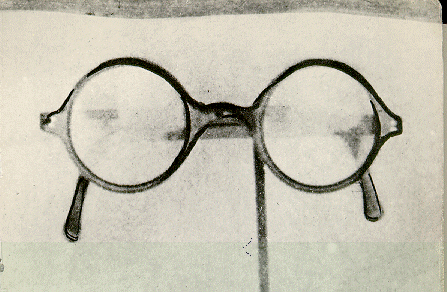A pair of horn-rimmed glasses nearly hanged Nathan Leopold and Richard Loeb. The glasses, belonging to Leopold, fell out of his suit as he helped position the body of Bobby Franks in a concrete culvert in a marshy area on the south side of Chicago. The glasses were discovered with the Franks body, eventually leading to the arrests and confessions of Leopold and Loeb.
Leopold had not worn glasses in months, and may never have needed them. Six months before the crime, Leopold was bothered by headaches that someone suggested may have been caused by eyestrain. Leopold visited an oculist named Emil Deutsch, at 30 North Michigan Avenue in Chicago, who prescribed a pair of reading glasses. Leopold wore the glasses for three or four weeks, the headaches disappeared, and Leopold never put them on again.
The reading glasses, unbeknownst to Leopold, were in the breast pocket of the "birding suit" he wore on May 21, 1924. A few days after discovery of the Franks body, Leopold read in a newspaper that a pair of glasses had been found with the dead boy and that detectives believed they belonged to the murderer. Leopold considered his next move: should he go to the police and claim that he lost them on one of his frequent birding expeditions in the area, or should he do nothing in the hope that no link to him could be established? Leopold called Loeb to ask what he should do. In his book, Life Plus Ninety-Nine Years, Leopold recounts his phone conversation with Loeb:
"Well, you know I wore glasses for a couple of weeks last year. And the picture in the paper looks just like my pair. Then I looked all over for them and I can't find the damn things."
"Well, you know how you are about neatness. You have a place for everything--one place for everything! Let's look again."
"O.K. But you're not going to find them."
"How in hell could you be such a stupe. Look, can they trace them, do you think?"
"That's just what I wanted to talk to you about. They're a very common prescription. Half a degree of astigmatism or something, the doc said. There must be a jillion pairs like them in the city . So I don't think there's much chance of their being traced. On the other hand, I've got all the alibi in the world for their being found there. You know I go birding out there all the time. Hell, I've been there--right at that same spot--half a dozen times in the last couple of weeks. I had my birding class there Saturday. And I was out there with Bill Campbell and Harry Stokes on Sunday, I think. I've got oodles of respectable witnesses. Whaddaya say I go in and claim them. Kinda spike their guns in advance."
"Naw, I think that'd be a fool caper. Don't get mixed up in the case at all. They might try some rough stuff on you. And besides, it might take you a hell of a while to talk your way out of it. You've got your exams coming up and everything. Of course the crucial thing is what chance there is the damn things can be traced to you."
"Well, as I said, I know the prescription is a very common one. The doc told me so. And how are they going to know what oculist they come from? They'd have to go through the records of every oculist in town and then check on a couple of thousand people."
"Hell, let it go. You don't know your glasses are gone. Make 'em come to you. Then, if wurst comes to sausage, you can be so surprised that the glasses are yours. Then's the time to tell your story about losing 'em birding."
Nathan Leopold was visited at his home days later by two police officers. The game warden at the Eggers Woods forest preserve, where the Franks body was found, had identified Leopold as a frequent visitor to the preserve. There was little reason to suspect Leopold at this point; the officers mainly wanted him to provide the names of other people he knew who went to the area. One of the officers asked Leopold whether he wore glasses. "No, sir, I don't," was Leopold's reply.
Leopold's prescription may have been a very common one and the frames were ordinary too, except for a patented hinge connecting the earpiece to the nosepiece. The hinge was manufactured by a New York company that had only one outlet in Chicago: Almer Coe & Co. Especially unfortunate for Leopold was the fact that Almer Coe had sold only three pairs of glasses with the patented hinge. One belonged to a lady, a second pair belonged to an attorney (Jerome Frank, who, nearly thirty years later as a federal appellate judge, would deny the final plea of Juilius and Ethel Rosenberg for a stay of their executions) traveling in Europe, and the third belonged to Leopold. It was a matter of a few days before detective work on the glasses led police back to Nathan Leopold.
Leopold was picked up and brought to the LaSalle Hotel, where he was met in a hotel room by State's Attorney Robert Crowe and two other investigators. Leopold suggested to Crowe that the glasses fell from his suit pocket when he tripped near the spot where the body was found. He was, he said, running in his boots trying to take a shot at a Wilson's phalarope when he fell. Assistant State's Attorney Joseph Savage asked Leopold to demonstrate how they might have dislodged. Time after time Leopold purposely tripped and fell on the hotel room floor. The glasses never fell out of his pocket.

